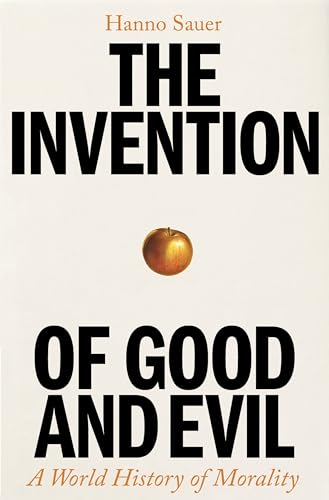The Invention of Good and Evil: A World History of Morality, by Hanno Sauer, has - I think - one of the best titles of any non-fiction book. Who could fail to be intrigued?
After all who hasn’t wondered where our concepts of right and wrong come from? How did the concept of evil originate in human history? What did it mean to be good in the past, why and how does it change over time?
Unfortunately after having finished The Invention of Good and Evil - and re-reading it carefully to check I wasn’t missing anything, I am still none the wiser on any of these questions.
It isn’t a bad book, but it isn’t a world history book and neither does it really get to grips with the concepts of good and evil.
Relabelling
A more accurate, if less compelling, title would be: The psychological roots of todays’ fractured society in the West, and why we shouldn’t give up, but instead keep trying to get on better with one another.1
History schmistory
The main difficulty I have with this book is perhaps a personal one: I don’t think Sauer is particularly interested in history, rather the past is used as a source of anecdotes to illustrate points he wants to make about the way things are today.
To put it another way I get the feeling that he is not really interested in what your great-great-great-Grandmother was up to - except to the extent that your great-great-great-Grandmother conditioned your own behaviour. In this view each human being is made up of layers of conditioning, with the deep past buried deep down at the core, and more recent influences up at the surface.
Perhaps the best way I can help you decide if you will like it is to go through the book chapter by chapter, outlining the things Sauer discusses. If you are left a bit cold or get bored halfway through this review, give it a miss. If you feel like things are hotting up, dive in.
Here goes...
What’s in the book
The book starts off when we stopped being chimpanzee-human ancestors and started being human ancestors, about 5 million years ago...
(If you want a clear idea of what happened when as we travel through deep human history I can recommend my own painstakingly assembled map of the past, which uses a similar base 10 scaling system to Sauer’s)
🐒 5 million years ago
Leaving the forests for reasons that are unclear but that no doubt seemed sensible at the time, humans were forced to find a way to live on the open plains of Africa. With no trees to scamper up, we had to find other ways to deal with angry rhinoceroses. We realised that if we worked together the other animals didn’t stand a chance - either as our predators or our prey.
But it is not easy to cooperate - how do you stop freeloaders undermining the whole enterprise - hanging back when the rhino is being speared to death and pushing to the front when it is time to start the butchering? Part of the solution was to co-operate only within small trusted kinship bands, dividing the world into us and them.
To appreciate how far we have come Sauer invites us to consider what would happen if a two hundred chimpanzees were loaded onto a transatlantic flight:
...seats would be demolished, windows shattered; there’d be pools of blood on the carpet, torn ears, fingers and penises, countless dead apes throughout the plane, and great howling and gnashing of teeth.
Hanno Sauer in The Invention of Good and Evil, describing an aeroplane full of chimpanzees
🚶 500,000 years ago
As more modern strains of human emerged we underwent a process of self-domestication. Like other animals that have been domesticated this means pacific juvenile traits are retained into adulthood. Basically we stay cute and cuddly forever!
How did this happen? The most likely assumption, Sauer tells us, is that we just killed off the most aggressive members of our societies, leaving only the cute ones:
A species that kills its most belligerent, aggressive and ruthless members over hundreds of generations creates a strong selection pressure in favour of peacefulness, tolerance and impulse control. We are the descendants of the friendliest.
Hanno Sauer on the domestication of humans
Key to this is the strong desire for punishment of wrongdoers whether or not we have been a victim - ‘altruistic punishment’ which is seemingly a uniquely human behaviour (at least on planet earth).
With poor behaviour punished and repeat offenders killed we could develop even larger more complex societies. These big societies benefited everyone, by sharing more good ideas to more deserving people.
🏹 50,000 years ago
Here Sauer introduces us to the idea of cumulative cultural evolution - no one person can remember how to do everything, but as a collective we retain the knowledge and the skills to makea bow and arrow for example, or produce a pair of waterproof moccasins.
Morals and values are part of this cumulative culture, they are learned along with everything else.
(As an aside I am still not sure if we should see our morals as culturally contingent, or a superficial coating on top of consistent human ideas of good and bad, right and wrong? The book leans to the idea that all humans are the same but feels a bit contradictory in places.)
👑 5,000 years ago
At about this time cities and agriculture sprouted up in optimal locations around the globe: Mesopotamia, the Indus river, Northern China, Central Mexico. With so many people living together, high levels of specialisation, and unprecedented surpluses, humans experienced the rise of ‘radical inequality’ - kings and priests basically.
And with ever more stuff to steal and pilfer, humans ramped up the scope of punishment a notch or two with the idea that not only would you be policed by your fellow humans but also by the gods:
Belief in the authority of moralising gods... played a key role in the emergence of early advanced civilizations
Hanno Sauer, The Invention of Good and Evil
Alongside the immortal (and morally vengeful) gods came the idea of your own immortal soul: now not even death could get you off the hook!
⛪ 500 years ago
In the last few centuries we see the emergence of Western, Educated, Industrialised, Rich and Democratic people: ‘WEIRD thinkers’. Emphasising their professional identity over their family identity and with a tendency to moral universalism, this bunch (of which I am one) are profoundly odd from a historical perspective.
How did this mindset emerge? Sauer follows the arguments of the Harvard Professor Joseph Heinrich who pinpoints the medieval Catholic church’s marriage program as the inadvertent cause.
Because (the then Pope said) you were no longer allowed to marry your cousin, newly married couples had to move out of their parental homes, and you could leave money to whoever you wanted when you died, traditional family power structures were weakened. Thus leading to greater cross societal cooperation, and (hey presto) increased economic activity.
And leading (also inadvertently) to a set of moral values that get applied equally whether or not you are talking about someone on the other side of the world or your own mum - well she did kick you out when you got married after all.
✌️ 50 years ago
After a couple of hundred years of trying our best to kill each other in the last 50 years we finally realised that “we are all human beings, and we all deserve moral esteem and respect”.2
We have realised that many norms are morally arbitrary - which Sauer describes as ‘demoralisation’. For example, by not judging people who choose to practice (or not) premarital sex. At the same time we have ‘moralised’ other things. For example we do tend to judge people who smoke in public places.3
This shifting moral focus is tentatively described as moral progress.
😡 5 years ago
The last chapter!
Here Sauer gets into wokedom and anti-wokedom - the conflict between freedom and equality that we sometimes wrestle with today. The temptation to legislate for equality at the expense of freedom is seen as the essence of the ‘culture wars’.
Sauer also makes the point that the more extreme positions that people adopt when fighting for a culture army are positions that are adopted precisely because they are extreme, thereby strongly signalling group identity.
Putting a slightly different slant on a similar phenomenon he goes on:
The notion that some people are simply too stupid or irrational to distinguish true from false is inaccurate and self-righteous – because of course, only other people are irrational and deluded. In reality, we are all mere consumers of cumulative cultural capital that holds us hostage in informational captivity. The processes that lead some people to adopt fake news are, counterintuitive though it sounds, completely rational - the same mechanisms are at work that we have used to acquire any other form of knowledge.
Hanno Sauer, The Invention of Good and Evil
The book ends on the optimistic note that our opinions are actually far more malleable than we think. Just because we believe them deeply doesn’t mean our attachment is any more than superficial.4
This is good news because:
We don’t disagree - we just hate each other.
Hanno Sauer, The Invention of Good and Evil
Style guide
Each sentence and paragraph is nicely crafted - the book has clearly been written to make it as fun and accessible to the ordinary punter as possible. Each section has its own subheading which I think breaks up the text nicely.
The translation is also seamless, with cultural references switched to UK versions and moneys to pound sterling.
However even though each of the constituent parts of the book is lovely they didn’t really stick together for me. I’m not sure why this is, but by the end of it I was losing track of the main theme, and was struggling to remember how it linked to the beginning.
What I liked most about the book
I’m certain that The Invention of Good and Evil doesn’t have all the answers. I don’t think it even has many of the answers.
What it does have though is lots of interesting ideas and many fascinating questions.
What are the evolutionary and cultural origins of my (our?) mortality? How relative or absolute do I want my own moral position to be? How far should I indulge my desire to punish my kids when one of them has bashed the other one?
I am writing this on the tube in London as I come home from work: Sauer has also made me appreciate my fellow human passengers that little bit more. At least they aren’t chimpanzees.
I think the original title of the book is Moraal: Goed en kwaad van prehistorie tot polarisatie (Moral: Good and Evil from Prehistory to Polarisation), which feels a bit more accurate. ↩︎
Might this be another WEIRD viewpoint? ↩︎
Another WEIRD candidate? ↩︎
Sauer reports a fascinating experiment when unsuspecting members of the US public in 2016 were asked to score Donald Trump and Hillary Clinton on various characteristics. After they had submitted their scores, the scores were then secretly adjusted and handed back to them. Apparently no-one had any problem justifying their modified positions, as long as they were confident that they were their own! One participant who rated Hillary Clinton 94% on ‘experience’, when asked to justify why they had put 59% (they hadn’t) had no trouble articulating this: “I think they’re both experienced in their field...” ↩︎
Book details
(back to top)- Title -
The Invention of Good and Evil : A World History of Morality
- Author -
Hanno Sauer
- Publication date -
September 2024
- Publisher -
Profile Books
- Pages -
416
- ISBN 13 -
9781800818293
- Podcast episode -
Intelligence Squared: A History of Good and Evil with Hanno Sauer
- Amazon UK -
- Amazon US -



